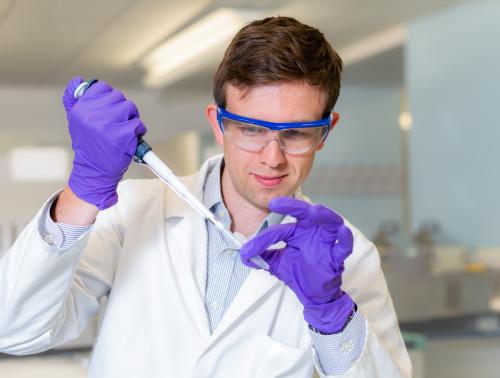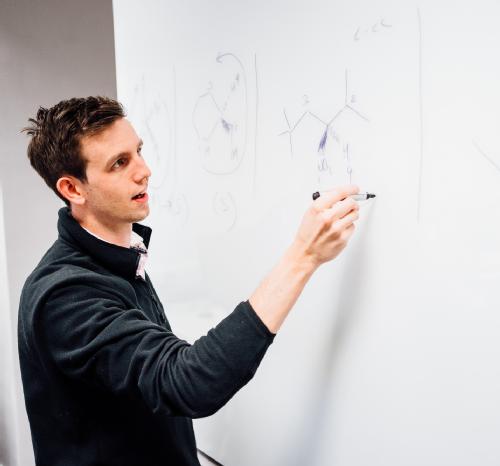The Way Ahead | Drug Biosynthesis


The way ahead is capturing drug biosynthesis in action

Dr Matthew Jenner, Department of Chemistry, Warwick

As an undergraduate I could never have envisioned myself wanting to work with mass spectrometry. It’s just a routinely used analytical tool for looking at small molecules, was my rather naïve understanding at that stage. It also wasn’t what I was interested in, and it didn’t seem relevant to the area of science I enjoyed – biological systems, and particularly proteins.
However, my final year undergraduate project presented a rather unique opportunity to study them directly using mass spectrometry. Under the guidance of Professor Neil Oldham at University of Nottingham, I was introduced to the world of native protein mass spectrometry – and I was instantly hooked.
It was something different, something new, and the thought of being able to observe these biological events in action sounded intriguing.
The project proposed that we could spray proteins into a mass spectrometer, and under certain conditions they would stay folded, allowing us to visualise small molecules bind to them - a process that is the very basis of drug design. Our study, and particularly the technique, captured my imagination and even led to my first scientific publication. 
At the time, this was a rapidly emerging technique with many pioneering scientists driving the development of new instrumentation allowing increasingly ambitious experiments – an exciting time to be involved. Recent developments in this field have now enabled intact membrane proteins to be analysed in the same fashion, which represent some of the most desirable drug targets.
I’m currently working on a project that received £1.25M of funding from the UKRI Future Leaders Fellowship scheme. The Fellowship will develop my career for the best part of a decade, and the funding also pays for the specialist equipment we need for mass spectrometry.
The research itself focuses on investigating megasynthases (very large enzymes, or proteins) in fungi, which are responsible for producing a vast number of biologically active natural products with important applications in modern medicine (e.g. lovastatin and cyclosporin). The precise assembly of these complex compounds relies on highly programmed interactions within the enzymes.
Despite the importance of these interactions, they remain poorly understood as they are so difficult to study. It is the greatest remaining problem in our understanding of fungal megasynthases, and represents a huge obstacle to rewiring these enzymes towards user-designed molecules. We’re applying our state-of-the-art mass spectrometry methods with other complimentary techniques to uncover the molecular factors governing programming. 
Once we’ve figured out the ‘molecular rules’, we can try to reprogramme the enzymes to make new versions of these molecules – and potentially help create new or improved drugs. It’s a bit like cracking a code. I’m a big believer in Richard Feynman’s mantra: “what I cannot create, I do not understand” - and perhaps we’ll be creating some new megasynthases soon.
I lead the Jenner Lab here at Warwick, where we’re using our expertise in mass spectrometry and chemical biology to solve complex biological problems. But we’re also part of a wider group of researchers at Warwick who work collaboratively, sharing their expertise and equipment. This interdisciplinary environment is essential to our success and is how modern science is done.
One of the big challenges has been to adjust from doing experiments myself to managing students and post docs, delegating tasks and stepping back from that hands-on role, all in quite a short space of time. I’ve been very fortunate to have some fantastic PhD students in the early years of my lab, who have driven projects forward with their own ideas, which has been fantastic to see.
Going forward, I really want to inspire these students, because I’ve benefited from fantastic mentorship myself. After my PhD at Nottingham with Professor Neil Oldham, I joined Warwick in 2014 as a Postdoctoral Research Fellow under the supervision of Professor Greg Challis, and their support and guidance has undoubtedly helped to shape my career to where it is today.
As I say, I never expected to work in mass spectrometry - but things have turned out rather well.
chemistry
